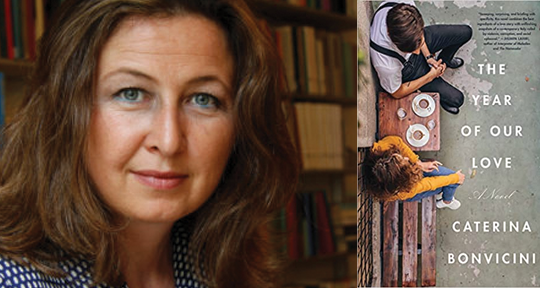The Year of Our Love by Caterina Bonvicini, translated from the Italian by Antony Shugaar, Other Press, 2021
“Life is a combination of magic and pasta,” the celebrated Italian filmmaker Federico Fellini once observed, and who can know this better than the boot-shaped Repubblica famous for an inimitable cuisine that has influenced the course of humanity? It doesn’t come as a surprise that The Year of Our Love was at least partly inspired, as explained in the author’s note, by a local osteria (a simple or inexpensive restaurant) and tales told over aromatic wine and a hot bowl of spaghetti.
Born in the picturesque city of Florence in 1974, the writer Caterina Bonvicini holds a degree in modern literature from the University of Bologna and has written more than ten novels, some of which have won prestigious prizes, among them Premio Frignano in Italy and the Grand Prix de l’Héroïne Madame Figaro in France. Critics often highlight the way her texts expose the bourgeois lifestyle, while placing women, with their conflicting worldviews, internal dilemmas, and well-hidden feelings, at the center of the story.
The facts of her life reveal similarities between Bonvicini and the novel’s protagonists. The journey starts in 1979, only five years after she was born, at the height of the so-called Years of Lead, when Italy is locked in the firm grip of warring right- and left-wing factions. The first pages are filled with markers of the recent past: terrorist attacks, including the infamous Italicus Express bombing; numerous brigades and gangs; brutal kidnappings. Immersed in a world of turbulent clashes and savage confrontations, we meet Valerio Carnevale and Olivia Morganti—raised together even though their families are separated by a social divide that could hardly be bridged under ordinary circumstances. The passing seasons of childhood in the Emilia-Romagna region, home to the picturesque Bologna and the place where Valerio eventually studies to become a magistrate, overflow with stories about guns, hiding places, and bodyguards, exquisitely recounted by the girl’s grandmother, Manon, whose notions about beauty and truth exert a great influence on the children. But after Valerio’s mother begins an affair with a handsome swindler, the family is forced to move to one of Rome’s least prestigious neighborhoods, and the interaction between the two changes profoundly. Finally, it comes to a halt.
Years go by and when it seems as if their paths will never again cross, Valerio receives an invitation to Olivia’s eighteenth birthday party. A chain of events is set in motion, this time with more personal violence, chance meetings, and painful separations. The history of Italy over the following decades, characterized by Silvio Berlusconi’s policies and the suspiciously quick financial gain of a handful of notorious families, is a convenient setting against which the two of them, fully grown and with children of their own, find themselves running into each other’s arms:
Our love was an underground river, but the sensation was always that of a new beginning. We were no longer two children gauging the shapes and sizes of each other’s bodies, as we rolled and tumbled, nor were we even two young people mythologizing sex and not daring to play. No, we were two fully conscious adults, with a certain amount of experience, and we realized that we had something precious in our possession—namely a distant and mysterious familiarity. Something that we could truly call intimacy.
The translator’s introduction is an essential companion to the world of the book. Antony Shugaar sheds light on the factual background, which in his words, functions similarly to what in cinematic terms would be called a “fitting,” a shadow always lurking, making its presence felt even without fully being there. Thanks to Shugaar’s rich vocabulary, even readers unfamiliar with the original are able to grasp the social importance of the novel’s dialects. We find out that Romans have different names for everything concerning daily life and that for those living in the borgata (an area with improvised or poor quality housing), mastering the so-called “Romanesco” dialect means learning a vital survival skill. As Valerio puts it:
I only ever spoke to the kids on “Via Chiabrera” in dialect. I couldn’t say whether speaking in dialect was just a tactical move to help me fit in, or whether that new idiom dialect was actually starting to feel like home, a welcome achievement.
The translator has managed to painlessly insert clarifying notes within the text wherever appropriate or necessary. The cultural differences are sometimes noted with phrases such as “the Italian equivalent of” or “the popular saying for.” There are several instances when Shugaar has chosen to include the English rendering of a whole sentence or paragraph in brackets, right after the original, with the aim of providing a glimpse into the natural flow of the primary language, as well as into the significance of vernacular the author used to underscore a particular detail (e.g., a character’s vulgar slang or a song well known for its rhymes).
It’s not only local melodies that make it to the heart of the book. Both Olivia and Valerio quietly hum The Beatles’ “I Want to Hold Your Hand” when life feels unbearable. No matter how many miles or months separate them, their shared past is but a thought away. Herein lies the strength of Bonvicini’s novel. She gradually expands the world surrounding the most intimate human emotions, then reminds the reader of inevitably missed opportunities in a way that’s almost cathartic:
She went by me on a bicycle . . . We exchanged a glance, I believe. Even though I can’t say for certain. It was the briefest interval of time in our lives, and yet in that fraction of a second there was concentrated almost forty years of love.
The final promise is not bleak, but full of forgiveness and hope—after all is said and done, life is never bigger or smaller than the combination of magic and pasta. Especially in Italy.
Andriana Hamas is Asymptote’s editor-at-large for Bulgaria.

